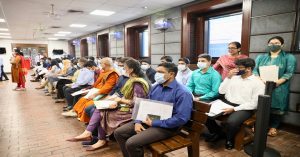- Have any questions?
- +880-1832219025
- englishrajib877@gmail.com
Spoken English-A Personal Interview

Spoken English-Shop Assistant and Customer
February 8, 2021
Spoken English-After Getting a Job
February 10, 2021Spoken English-A Personal Interview

Spoken English-A Personal Interview
David: What do you do in the morning?
John: I usually get up very early in the morning. Then I wash my hands and face and say my prayers.
Then I study for three hours. After that, I take my breakfast and go to my office.
David: What do you usually take for breakfast?
John: I usually have bread, butter, and coffee for my breakfast. Sometimes, I take Parata, vegetables, tahari, nan, etc.
David: How many hours do you work in your office every day?
John: I go to the office at 8 a.m. and return at 6 p.m. Sometimes, I am late and do not return before 10 p.m.
David: Are you a happy man?
John: I am satisfied with what I have. So, I think I am a happy man.
David: When do you get depressed?
John: When somebody lies or cheats with me I get very depressed.
David: Do you believe you are a good man?
John: Yes, I do. I am a little bit straight forward and outspoken. So, sometimes my behaviour hurts people.
But I always try to be honest with people.
David: How do you spend your leisure hours?
John: In my leisure hours I go to visit some worth-seeing places.
I also play indoor games such as chess, computer games, etc. Sometimes I watch TV and movies.

David: What do you do in the afternoons?
John: In the afternoons I chat with my friends over the phone. I also watch TV and listen to music.
David: When do you have supper?
John: I have my supper at 11 p.m. Generally I have my supper with my family at my home.
David: What is your favourite menu?
John: My favourite menu is chicken corn soup, fried rice, prawn, fried hilsha fish, chicken masala, and real coffee.
David: When do you go to bed?
John: Usually I am very late to bed. I go to bed after 1 a.m.
Asking The Time
Conversation A
David: What time do you have?
John: It’s ten o’clock sharp.
David: Thanks a lot.
John: Don’t mention it.
Conversation B
David: What’s the time?
John: It’s almost eight.
David: Do you have the exact time time?
John: Yes, it’s two minutes to eight.
Conversation C
David: Excuse me, what time is it
John: It’s a quarter of two.
David: I guess my watch is slow then.
John: Yes, it’s two minutes to eight.
Conversation D
David: What time is it right now?
John: It’s five twenty-five.
David: I’ve got five thirty-five
John: You’re ten minutes fast then.
Conversation E
David: Do you have the correct time?
John: Yes, it’s two minutes to three.
David: Are you sure your watch is right?
John: It may be a few minutes slow.
Asking The time-2
Conversation A
David: What time is it now?
John: I don’t have my watch on right now.
David: Is there a clock around here?
John: There’s one in the next room.
Conversation B
David: Do you have the right time?
John: I was just going to ask you the same question.
David: My watch has stopped.
John: I forgot to wear mine.
Conversation C
David: Do you have any idea of the time?
John: I don’t know exactly, but it’s after nine
David: It was nine o’clock when I go there.
John: Well, I’m sorry. I cannot help you.
Conversation D
David: At what time is the meeting?
John: Eight o’clock.
David: Be there at eight o’clock sharp, then.
John: I’ll try to get there before eight.
Conversation E
David: How often does this station give the news?
John: Every hour on the hour.
David: When do they announce the weather?
John: Ten minutes to ten and ten minutes after the hour.
Going By The Clock
Conversation A
David: When is your first class?
John: At ten after nine.
David: When do you get back here, then?
John: About ten to twelve.
Conversation B
David: Ben will be back in ten or fifteen minutes.
John: How long has he been out of the office?
David: He’s been out since ten o’clock.
John: Then he’s been out for an hour more.
Conversation C
David: I got to the cafeteria around noon.
John: I was here, but I didn’t see you.
David: I think I left a few minutes after twelve.
John: I must have just missed you, then.
Conversation D
David: Our friends will meet us here.
John: Will they come here right after lunch?
David: No. they won’t be here until three o’clock.
John: Then I’ll come a little before three.
Conversation E
David: Let’s call Mary.
John: Let’s not call her right now.
David: May be this is a bad time to call.
John: Let’s wait until seven or seven-thirty.
Arriving Early or Late
Conversation A
David: I’m afraid we’re going to be late.
John: How much time is there left?
David: We’ve got about thirty or forty minutes.
John: That should be plenty of time.
Conversation B
David: Whom are you waiting for?
John: We’re waiting for our friend.
David: What are you looking so angry for?
John: Because he’s twenty minutes late already.
Dialogue between Mother and Son on Future career
Mother: Have you thought about what you want to pursue in the future, my dear?
Son: I have, Mother. It’s just that the choices seem endless, and I find myself standing at the crossroads, uncertain of which path to take.
Mother: That’s perfectly normal, my love. Your future is a vast canvas waiting for the brush strokes of your dreams. What ignites your passion? What sets your soul on fire?
Son: I’ve always been drawn to words, to the magic they weave. I want to be a writer, a poet who paints emotions with language.
Mother: Ah, a poet! Your words have a melody, a rhythm of their own. But my darling, the path of an artist can be challenging. Are you prepared for the uncertainties it may bring?
Son: I am, Mother. I believe that art is a journey, and I am ready to embrace the twists and turns. It’s not just about the destination; it’s about the beauty of the process.
Mother: Your determination warms my heart, my poetic soul. Pursue your dreams with vigor, and let the ink of your pen carve the stories only your heart can tell.
Dialogue between Father and Son on Climate Change
Son: Dad, is something bothering you?
Father: Yes, son, it’s about the state of our planet. The climate is changing, and not for the better.
Son: Climate change? Isn’t that something for governments to handle?
Father: It is, but it’s also something for each of us to consider.
We need to be mindful of our actions, and the impact we have on the environment.
Son: Dad, what can one person do? It feels like such a massive problem, the son replied, his voice tinged with helplessness.
Father: Every small effort counts, son.
We can make choices that are better for the planet, reduce our carbon footprint, and spread awareness.
Son: I just don’t know where to start. It feels overwhelming.
Father: Start small. Conserve energy, use sustainable products, and educate others.
Change begins at home, and if each of us does our part, we can make a difference.
Dialogue between Mother and Son on a Balanced Diet
Evelyn: Good morning, my poetic soul. Ready for another day of weaving words?
Alex grins: Always, Mom. But before I dive into the world of metaphors and similes, let’s talk about something equally important—balanced diets.
Evelyn: Balanced diets? Are we poets or nutritionists today?
Ah, but a healthy body fuels a creative mind.
Alex: It’s all connected, you know.
Evelyn: Alright, my nutritionist poet, what’s on your mind?
Alex: I’ve been thinking. We should be mindful of what we consume, not just in words but in food too.
A balance of proteins, carbs, and fats, like the harmony of rhymes in poetry.
Evelyn: Well, poetic nutrition advice. I like that. But why this sudden interest in balanced diets?
Alex: A healthy body sustains a vibrant soul, Mom. Imagine the verses that can bloom from a well-nourished spirit.
It’s like the dance of words on a page, each element complementing the other.
Evelyn: I see. So, our kitchen is not just a workshop for words but also a laboratory for balanced living.
Alex: Exactly. It’s about crafting a masterpiece in every aspect of life. A sonnet for the senses, if you will.
Evelyn: Well, my poet, let’s create a symphony of flavors and verses together.
A balanced diet for the body and the soul.
You can also read:
IELTS Reading Tips and Strategies
IELTS Writing Task -2 Essay Structures
IELTS Writing Task-2 Discuss Two View Points
IELTS Speaking-Describe a Present You Liked
Best IELTS Reading Tips and Tricks






18 Comments
Thanks. It’s very good for me.
I understand very easy.
Thanks a lot for your appreciation! Please read the given dialogues regularly that will boost your spoken English!
Thanks
Thanks a lot for your appreciation! Please read the given dialogues regularly that will boost your spoken English!
Good,Its perfect practice to .
Thanks a lot for your appreciation! Please read the given dialogues regularly that will boost your spoken English!
Thanks a lot 🙏
You are most welcome! Please read the given dialogues regularly that will boost your spoken English!
Thank you for your informations. I like so much.
Thanks a lot for your appreciation! Please read the given dialogues regularly that will boost your spoken English!
Thank a lot..
You are most welcome!
I can understand a little bit and I hope, i will understand in the days to come if you help me..
Thanks a lot for your feedback. If you need any help, you can comment here.
We must help you to boost your level of English!
Thank you
Its very easy and everybody can read it like me.
And how i can promote speaking reading english so show me the easy way of studying english.
I waiting for answer…
Thanks a lot for your appreciation. Here are our top tips on how to learn English quickly:
Read everything you can get your hands on. …
Actively take note of new vocabulary. …
Talk with real live humans. …
Use your friends. …
Ask a lot of questions. …
thank–for–your–appreâciation
You are most welcome!